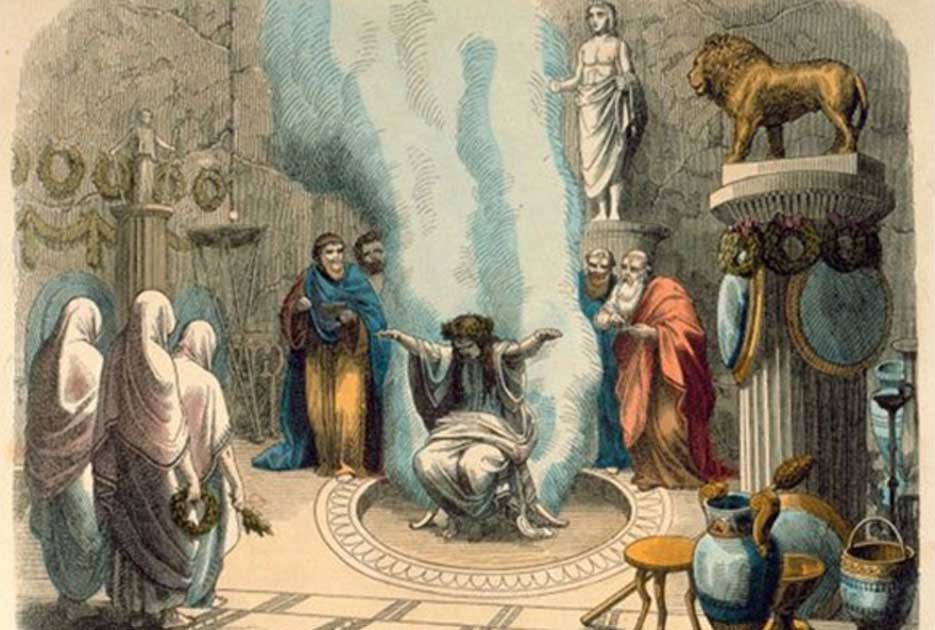[Greek] μαίνομαι (mainomai), [Latin] insania: to rage, to be mad, to rave as a maniac, to beside oneself, to be raving mad, to be totally irrational, to be out of one’s mind, to be furious; Jn.10:20, Act.12:15, Act.26:24,25, 1Cor.14:23

The seer (mantis), entering into an agitated state, seeks to ascertain the will of the gods.
Background Information:
Greek Hellenism: Essentially, this term means to rage. This term can describe the actions of fury, intoxication, anger, sorrow, desire, passion, frenzy, and madness. Homer illustrates the terror evoking manner of the fighting of the god or hero. Homer also describes the intoxicating effects of drink (wine). In the Illiad 6.132, the frenzied and intoxicated female worshippers of Dionysus tore Orpheus’ body to shreds. The Greek seer (mantis) is a professional diviner who seeks to interpret the will of the gods. The seer would often fall into a state of madness, rage, or inspiration.
Old Testament: This term, related to the Hebrew naba, pertains to the raving waves of human emotion. Such examples include passion, insanity, madness, religious frenzy, piety, faithfulness, and prophesy. The obedience and fidelity of Jews to the Law may appear to be a form of madness to outsiders who oppose the Law. Oftentimes, the worlds of belief and unbelief consider each other mad. Such examples may include inspiration, and willing martyrdom. The building of the tower of Babel is considered madness by God. But the mouths of fools spouts folly (Prov.15:2). My lips shall utter praise (Psa. 119:17). To day pours forth speech (Psa. 19:2). They shall drink, and be convulsed, and go mad (Jer.32:16). Do not give away to the same insanity as your brother (4Macc.10:13). They prophesied and did not cease (Num. 11:25). God came upon Saul, and he prophesied among the prophets (1Sam.10:10). Not only do I advise you not to display the same madness as that of the old man who has just been tortured (4Macc.8:5). Our father Eleazar broke the maddening waves of the emotions (4Macc.7:5).
New Testament: This term, used only to characterize God’s messengers, expresses the unbeliever’s unbelief toward divinely inspired witness and salvation. Those Jews, who rejected Jesus, believed that Jesus was out of His mind and mad. The disciples thought that the girl was mad for saying that the imprisoned Peter is standing outside the door. Peter escaped with the help of the angel. The Roman governor Festus thought that Paul was mad for speaking about the victory of the risen Christ. The believers, speaking with tongues, were considered to be mad by the non-Christians.
Scripture:
“Many of them said, ‘He is possessed and out of His mind; why listen to Him?’” Jn. 10:20
Some Jews rejected Jesus because He claimed to have been giving authority by the Father. So the Jews considered Jesus to be mad and be allowed to be accused of blasphemy.
“The disciples told her, ‘You are out of your mind,’ but she insisted that it was so. But they kept saying, ‘It is his angel.’” Act. 12:15
The disciples could not believe that this girl was giving them the news of an incredible divine miracle.
“So if the whole church meets in one place and everyone speaks in tongues, and then uninstructed or unbelieves should come in, will they not say that you are out of your minds?” 1Cor.14:23
These unbelievers would have considered these followers to be mad.
Conclusion:
Mantis, mania, maniac, manic, insane, insanity
It is interesting to note that the Greek term mantis means seer (one who prophesies). I think many of us can visualize the seer attaining an agitated state of frenzy, madness, or utterances. The seer may also seem to be praying or she could be out of her mind.
The Old Testament culture provides an important dynamic considering what is deemed madness. This idea is depicted depending either from the religious or non-religious perspective. This determination is dependent on one’s vantage. The tower of Babel was constructed by Nimrod. God punished Nimrod and those involved with building this tower with an indecipherable and babbling language. And yet today parents still do not name their child Nimrod! They must be out of their minds! ☺☺☺
The New Testament culture further develops the idea of what is considered mad through the perspectives of the believer and unbeliever. This idea becomes a value judgement of the unbeliever who rejects Christians and Jesus. The Jewish leaders see this person who claims to be the Son of God, who claims to forgive sins, and who claims to have authority from the Father. It is not surprising that the Jewish authorities would think that Jesus is out of His mind!
We are all aware of that iconic insect with a triangular head and large eyes. This insect stands in its upright posture, while remaining stationary with forearms folded. No wonder it is called a praying mantis. But I think we can all imagine what a praying mantis is thinking when it is looking at its lunch (insect). “If you all think that I am praying when I am looking at that bug, then you all must be out of your minds!”
